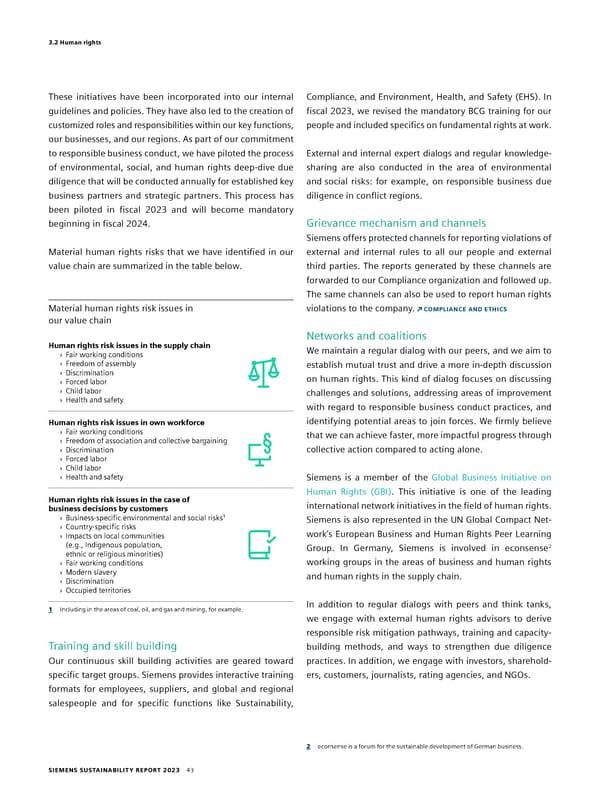3.2 Human rights These initiatives have been incorporated into our internal Compliance, and Environment, Health, and Safety (EHS). In guidelines and policies. They have also led to the creation of fiscal 2023, we revised the mandatory BCG training for our customized roles and responsibilities within our key functions, people and included specifics on fundamental rights at work. our businesses, and our regions. As part of our commitment to responsible business conduct, we have piloted the process External and internal expert dialogs and regular knowledge- of environmental, social, and human rights deep-dive due sharing are also conducted in the area of environmental diligence that will be conducted annually for established key and social risks: for example, on responsible business due business partners and strategic partners. This process has diligence in conflict regions. been piloted in fiscal 2023 and will become mandatory beginning in fiscal 2024. Grievance mechanism and channels Siemens offers protected channels for reporting violations of Material human rights risks that we have identified in our external and internal rules to all our people and external value chain are summarized in the table below. third parties. The reports generated by these channels are forwarded to our Compliance organization and followed up. The same channels can also be used to report human rights Material human rights risk issues in violations to the company. COMPLIANCE AND ETHICS our value chain Networks and coalitions Human rights risk issues in the supply chain We maintain a regular dialog with our peers, and we aim to › Fair working conditions › Freedom of assembly establish mutual trust and drive a more in-depth discussion › Discrimination on human rights. This kind of dialog focuses on discussing › Forced labor › Child labor challenges and solutions, addressing areas of improvement › Health and safety with regard to responsible business conduct practices, and Human rights risk issues in own workforce identifying potential areas to join forces. We firmly believe › Fair working conditions that we can achieve faster, more impactful progress through › Freedom of association and collective bargaining › Discrimination collective action compared to acting alone. › Forced labor › Child labor › Health and safety Siemens is a member of the Global Business Initiative on Human rights risk issues in the case of Human Rights (GBI). This initiative is one of the leading business decisions by customers international network initiatives in the field of human rights. 1 › Business-specific environmental and social risks Siemens is also represented in the UN Global Compact Net- › Country-specific risks work’s European Business and Human Rights Peer Learning › Impacts on local communities (e.g., Indigenous population, 2 ethnic or religious minorities) Group. In Germany, Siemens is involved in econsense › Fair working conditions working groups in the areas of business and human rights › Modern slavery and human rights in the supply chain. › Discrimination › Occupied territories 1 Including in the areas of coal, oil, and gas and mining, for example. In addition to regular dialogs with peers and think tanks, we engage with external human rights advisors to derive responsible risk mitigation pathways, training and capacity- Training and skill building building methods, and ways to strengthen due diligence Our continuous skill building activities are geared toward practices. In addition, we engage with investors, sharehold- specific target groups. Siemens provides interactive training ers, customers, journalists, rating agencies, and NGOs. formats for employees, suppliers, and global and regional salespeople and for specific functions like Sustainability, 2 econsense is a forum for the sustainable development of German business. SIEMENS SUSTAINABILITY REPORT 2023 43
 Sustainability Report Page 42 Page 44
Sustainability Report Page 42 Page 44